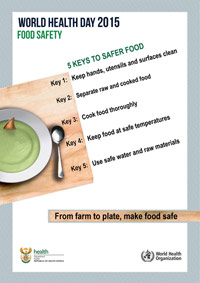7 April
World Health Day is celebrated on 7 April to mark the founding of World Health Organisation.
 The theme for 2015 is food safety.
The theme for 2015 is food safety.
Unsafe food is linked to the deaths of an estimated 2 million people annually – mostly children. Food containing harmful bacteria, viruses, parasites or chemical substances is responsible for more than 200 diseases, ranging from diarrhoea to cancers.
New threats to food safety are constantly emerging. Changes in food production, distribution and consumption; changes to the environment; new and emerging pathogens; antimicrobial resistance - all pose challenges to national food safety systems. Increases in travel and trade enhance the likelihood that contamination can spread internationally.
As our food supply becomes increasingly globalised, the need to strengthen food safety systems in and between all countries is becoming more and more evident. That is why the WHO is promoting efforts to improve food safety, from farm to plate (and everywhere in between) on World Health Day, 7 April 2015.
WHO helps countries prevent, detect and respond to foodborne disease outbreaks - in line with the Codex Alimentarius, a collection of international food standards, guidelines and codes of practice covering all the main foods and processes. Together with the UN Food and Agriculture Organization (FAO), WHO alerts countries to food safety emergencies through an international information network.
Food safety is different from food security
- Food safety means that food will not make you sick or harm you if you store, prepare and eat it correctly.
- Food security means the everyone always has enough safe and nutritious food that they need and like that helps them to be active and healthy.
Five keys to safer food
Food safety is a shared responsibility. It is important to work all along the food production chain – from farmers and manufacturers to vendors and consumers. For example, WHO’s Five keys to safer food offer practical guidance to vendors and consumers for handling and preparing food:
- Key 1: Keep clean
- Wash your hands before you prepare food or eat and after you go to the toilet; handle raw meat and poultry; change a baby's nappy; blow your nose; handle rubbish or play with your pets.
- When you wash your hands wet it under running water; rub it together for at least 20 seconds with soap; rinse it under running water and dry it thoroughly with a clean, dry towel.
- Use hot water with a detergent and a clean cloth or brush to wash plates and utensils.
- Keep pests like rats, mice, birds, cockroaches, flies and other insects as well as domestic animals away from food preparation areas.
- Key 2: Separate raw and cooked food
- Keep raw meat, poultry and seafood separate from other food while shopping.
- Store raw meat, poultry and seafood below cooked or ready-to-eat food in the fridge - blood from the thawed may drip on the other food.
- Store food in containers with lids.
- Wash plates and chopping boards used for raw food and use a clean plate or chopping board for cooked food.
- Key 3: Cook food thoroughly
- Food must reach a temperature of 70 degree Celsius for it to be safe to eat. This temperature kills a higher concentration of microorganisms or germs.
- Key 4: Keep food at safe temperatures
- Cool and store leftovers immediately after use.
- Leftover food should not be stored in the refrigerator for longer than three days and should not be reheated more than once.
- Key 5: Use safe water and raw materials.
- Use safe water from the municipality and other safe sources to wash fruits and vegetables; add to food; make up drinks; make ice; clean cooking and eating utensils and wash hands.
- Select fresh and wholesome food; avoid food that is damaged or rotting; choose food that is processed for safety such as pasteurised milk; check the dates on food when you buy it to help you make an informed choice; throw away smashed, swollen, bulging or air blown cans.
World Health Day 2015 is an opportunity to alert people working in different government sectors, farmers, manufacturers, retailers, health practitioners – as well as consumers – about the importance of food safety, and the part each can play in ensuring that everyone can feel confident that the food on their plate is safe to eat.
Source:




